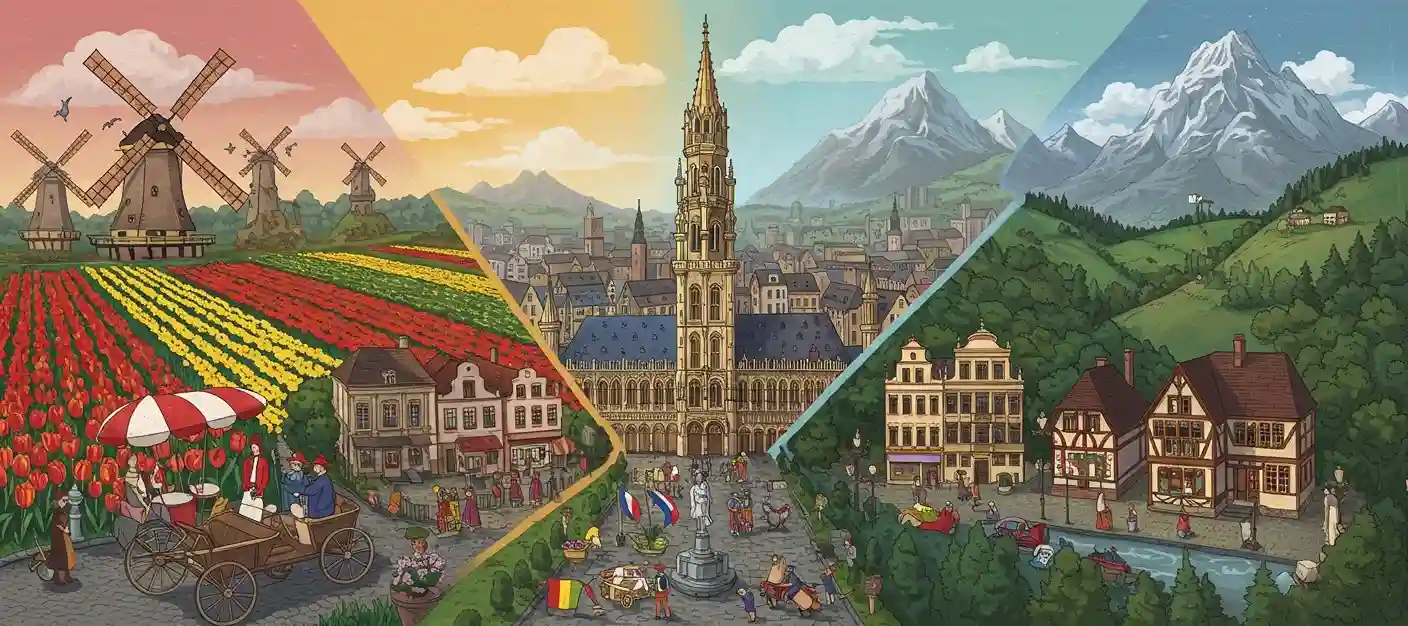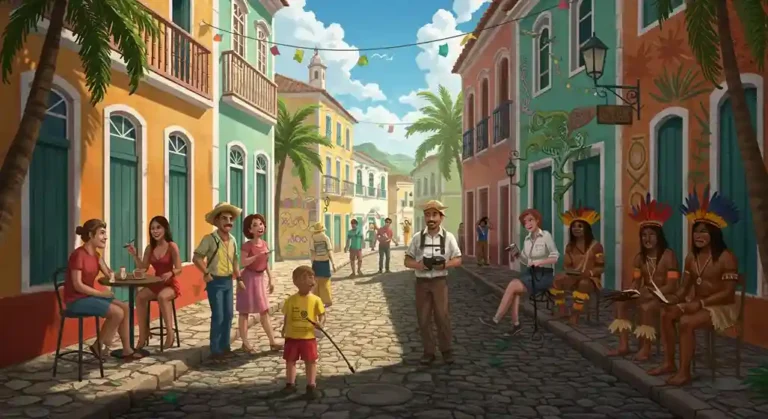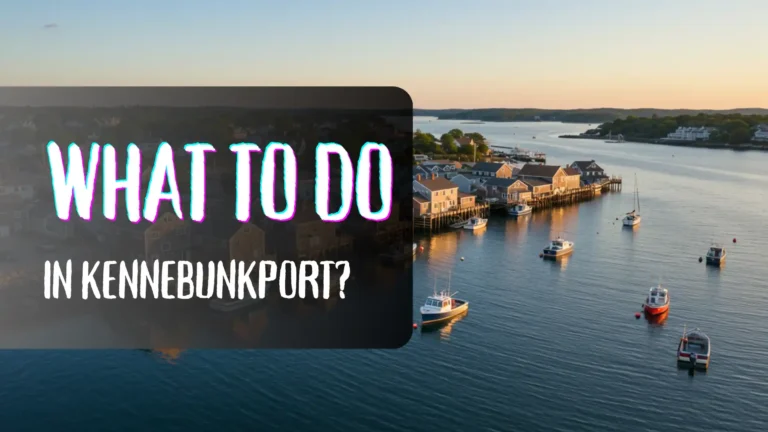Many travelers ask, what language do they speak in Belgium? At first, it may seem like Belgium should have one main language, but the reality is more layered and fascinating. Belgium is officially a multilingual country, and language plays a big role in its identity.
The country recognizes three national languages: Dutch, French, and German. Each of these languages is linked to a specific region, and together, they shape how Belgians live, work, and even govern.
Knowing this is not just about avoiding confusion while traveling. Language in Belgium connects deeply to culture, history, and even politics. When you walk through Brussels, Antwerp, or Liège, the language you hear tells you a story of the region’s background. Let’s explore how Belgium’s languages are spread, how they are used in daily life, and why the country proudly carries three official tongues.
But if you wish to explore more, you can also check what language do minions speak.
Official Languages of Belgium
Belgium’s constitution recognizes three official languages: Dutch, French, and German. Each of these has a clear place in the daily lives of Belgians. Understanding them makes the answer to what language do they speak in Belgium more complete.

Dutch (Flemish)
Dutch, often called Flemish in Belgium, is the most widely spoken language. About 60% of Belgians speak it, mainly in the northern region known as Flanders. Flemish sounds very similar to Dutch spoken in the Netherlands, though accents and expressions differ slightly.
In Flanders, Dutch is used in schools, media, and government. When you walk into a shop in Antwerp or Ghent, you’ll most likely be greeted in Dutch. This language dominates the cultural life of the region and has a strong local identity.
French
French is the second most spoken language in Belgium, covering around 40% of the population. It is dominant in the southern region of Wallonia and is also widely spoken in Brussels. For many Belgians, French carries elegance and international value, as it is also a major European language.
When visiting cities like Liège or Namur, French will be the language you hear most often. It is used in schools, newspapers, and official documents. In Brussels, although the city is officially bilingual, French is more common in everyday conversations.
German
German is the smallest official language in Belgium, spoken by less than 1% of the population. The German-speaking community is located in the east, near the border with Germany. Though small, this community has strong cultural pride and enjoys full recognition in Belgium’s political system.
Schools, government services, and media in this area function in German. This shows how Belgium values its linguistic diversity, no matter the size of the group.
Together, these three languages show the true answer to what language do they speak in Belgium—it depends on where you are standing.
Regional Language Distribution
The geography of Belgium explains why people speak different languages depending on the area. Each region has its own dominant language, and this shapes everyday life.

Flanders Region
In the north, Flanders recognizes Dutch as the only official language. When traveling here, from the port city of Antwerp to the medieval streets of Bruges, you will hear Dutch everywhere. It is the language of local government, schools, and businesses.
The Flemish people are very proud of their language, and it forms part of their identity. Even though many also speak English or French, Dutch remains the heart of communication in Flanders.
Wallonia Region
In the south, Wallonia is French-speaking, except for the eastern border area where German is the official language. Cities like Namur and Liège are fully French-speaking, giving the region a very different cultural feel from Flanders.
In the east, near Eupen and Malmedy, the German-speaking community thrives. Road signs, schools, and local services are in German, showing how Belgium respects linguistic rights at a local level.
Brussels-Capital Region
Brussels is a unique case. It is officially bilingual, recognizing both Dutch and French. Government offices, street signs, and documents are provided in both languages. However, French is more commonly spoken by the local population.
As a traveler, you may experience all three languages in a single day in Brussels—hearing Dutch on a tram, French at a café, and even German from a tourist. This mix gives the city its international character.
Language in Education, Media, and Government

Language in Belgium does more than define regions—it also shapes how people learn, work, and stay informed.
Education
Children in Belgium are educated in the language of their community. Schools in Flanders teach in Dutch, those in Wallonia teach in French, and those in the German-speaking region use German. Learning a second or third language is common, especially English, but the first language of schooling depends on the region.
Media
Television, radio, and newspapers are also divided by language communities. Flemish people watch Dutch-speaking channels, Walloons follow French-speaking media, and the German community has its own outlets. This means that Belgian culture is rich and varied, influenced by the different language streams.
Government
Government services in Belgium reflect this division as well. Documents, forms, and public communication are offered in the local official language. At the federal level, services are provided in all three languages. This ensures fairness, but also shows how central language is to the nation’s identity.
Why Belgium Has Three Official Languages
The question of why Belgium has three languages is tied to its history and geography.
Belgium is surrounded by powerful neighbors: France, the Netherlands, and Germany. Over centuries, borders shifted and cultural influences blended. Northern Belgium was historically tied to Dutch culture, the south connected with France, and the east with Germany.
When Belgium became independent in 1830, French was the dominant political language. However, Flemish communities pushed for equal recognition, leading to Dutch being made official. Later, after World War I, Germany lost parts of its territory to Belgium, bringing in a small German-speaking population.
Political agreements since then have carefully balanced these three language groups. The result is a country where each community has the right to education, media, and governance in their own language.
Other Languages in Belgium
While Dutch, French, and German are the official languages, Belgium is even more multilingual in practice.
English
English is widely spoken, especially among young people and professionals. Many Belgians see English as a bridge language, useful for business, travel, and international communication. In Brussels, where the European Union is based, English is often used in meetings and daily work.
Immigration Languages
Belgium is home to many immigrant communities. Arabic, Turkish, Portuguese, Polish, and Spanish are spoken in households and neighborhoods across the country. This adds another layer to Belgium’s already diverse language picture.
Walking through markets in Brussels, you might hear a mix of languages in just a few steps. For many Belgians, switching between languages is a normal part of daily life.
So, The Answer to What Language do they speak in Belgium is:
The answer is threefold: Dutch, French, and German. Dutch is the most spoken, French has a strong presence, and German represents a proud minority. Together, they create a rich cultural balance that defines the country.
Belgium’s multilingualism makes it unique in Europe. From education to politics, language plays a central role in shaping identity. For travelers, knowing even a few phrases in Dutch, French, or German can make the experience more rewarding.
In the end, Belgium shows us how language can be more than words—it can be a bridge between communities, history, and culture.
FAQs
Q1. Is English widely spoken in Belgium?
Yes, many Belgians speak English, especially in Brussels and larger cities. It is common in business and tourism.
Q2. Which language should I learn before visiting Belgium?
It depends on where you’re going. Dutch is useful in Flanders, French in Wallonia and Brussels, and German in the east.
Q3. Why does Belgium have three official languages?
Belgium’s history and borders with France, the Netherlands, and Germany influenced its language landscape. Political agreements ensured equal recognition.
Q4. Do people in Brussels speak French or Dutch?
Both, since Brussels is officially bilingual. However, French is more commonly spoken in daily life.
Q5. What percentage of Belgians speak English?
Around 55–60% of Belgians can speak English, with higher rates in younger generations and urban areas.








Leave a Comment